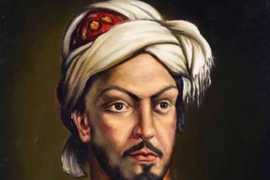The great Azerbaijani poet Imadaddin Nasimi

Imadaddin Nasimi is the great poet, philosopher, thinker and one of the prominent representatives of the Azerbaijan national language poetry. Nasimi was born in 1369 in one of the ancient cultural centers of Azerbaijan, in Shamakhi city, on the crossroads of the Great Silk Road. The poet's true name is Ali. He was called "Seyid" as he came of the kin to the Prophet. He received his pseudonym "Imadaddin", which means the "support of the religion" because he received perfect religious education in his childhood, and in his early youth, he deeply studied the Koran, hadiths and other influential religious literature. He also wrote under the pseudonym "Huseyni" and "Seyyid".
The poet took the pseudonym “Huseyni” in the honor of the famous Sufi Sheikh Hallaj Huseyn Ibn Mansur, and the pseudonym "Nasimi" was in honor of the founder of the hurufism trend Fazlullah Naimi. Nasimi is also mentioned as "Shirvani" in some sources because of the place of his birth. But the most commonly used literary pseudonym was Nasimi.
Nasimi’s life can be divided into two stages.
The first stage covers the period up to 1386. During this period Nasimi improved his education, studied the religious and secularized sciences of that period, he also studied the poetry and philosophical thoughts of the Near and Middle East that had developed in three languages - Arabic, Persian and Turkish. His profound knowledge of Azerbaijan language was reflected in his works.
The second period of the life and activity of the poet is related to the arrival of the founder of the hurufism, one of the Sufism branches, Fazlullah Naimi who came from Tabriz to Shirvan in 1386 to propagate his ideas. After Nasimi had got acquainted with Naimi, he liked his ideas and dedicated the following 30 years of his life to the propaganda of these ideas.
After the execution of Naimi in 1394, Nasimi went to Tabriz, then to Anatolia and was imprisoned repeatedly for disseminating the ideas of hurufism trend based on "Vassiyyetname" ("Testament") of Naimi.
In the last years of his life he lived in Aleppo, and he was imprisoned there being proclaimed as "an unbeliever" and "irreligious one", and his skin was off alive by the order of the Egyptian ruler and instigation of the clergymen. This event took place in 1417 and was reflected in a number of historical resources. The great poet was buried in Aleppo.
Nasimi passed through a difficult creative way. Nasimi being a lyric poet started the literary activities with love poems. Later, he became the founder of the philosophical ghazals and worked on political, social and moral subjects of that time. He expressed his critical opinions dreadfully to say openly about life and society in his couplets about love or descriptions of nature.
Artistic creativity of Nasimi is an important milestone in the development of Azerbaijani poetry and literary language. Nasimi utilized such modes as distich, ode, ghazal, tuyug, mustezad, tarjiban, mulamma of the Eastern poetry. However, ghazal takes the leading part among them.
It is possible to divide the ghazals of Nasimi according to their subjects. These ghazals describe and admire beautiful women whom Nasimi met and observed throughout his life. Nasimi expresses his amazement in front of the human beauty and depicts his sincere love feelings. In the second part of the ghazals, Nasimi calls men to be perfected, to know themselves and to keep themselves away from brutal passion.
The poet’s ghazal “Yanaram” (I will burn) is dedicated to love and begins with the following couplet:
I will burn in the morning being far from you, my beauty,
I will burn even more while wishing to see you.
Nasimi’s poetry is characterized by its optimism, its belief in the future, great belief in becoming a perfect person by perceiving someone’s beauty and majesty. The poetry written by the poet in the native language exerted a strong impact on the development of Azerbaijani poetry, as well as on the creativity of such great poets as Shah Ismayil Khatai, Fuzuli, Molla Panah Vagif.
Nasimi gained popularity as the symbol of manliness, courage, heroism in the history of Azerbaijan literature and oral folklore.
Nasimi brought valuable novelties to Azerbaijan literature through his creativity and played an important role in the development of poetry culture of Azerbaijan. He entered into the history of Azerbaijan literature as a flaming humanist, warlike poet, who enriched the poetry in terms of a subject, an idea and a mode. Nasimi exerted a very significant impact on the development of the literary language of Azerbaijan and enhanced it in terms of lexical artistic expression means.
Imadaddin Nasimi was the poet of Azerbaijan and the great thinker of his time. His poems are widely known in Azerbaijan, Middle East, Iraq, Asia Minor and Syria, as well as Central Asia. Nasimi influenced not only Azerbaijan literature, but also all Turkish literature beginning from the XV century. The works of the poet are kept in the form of manuscripts in a number of libraries of the world and have been published repeatedly. Many research works have been written about Nasimi. By the initiative of the national leader of Azerbaijan Heydar Aliyev the 600th anniversary of Imadaddin Nasimi, one of the most prominent representatives of Azerbaijani literature was included to the list of UNESCO and in 1973 was widely celebrated worldwide.
This year the 650th anniversary of Azerbaijani poet Imadaddin Nasimi is celebrated internationally and by the Order of the President of the Republic of Azerbaijan Ilham Aliyev 2019 year was declared as the year of Nasimi.
The name of Imadaddin Nasimi is perpetuated as a symbol of heroism for the sake of the truth, and the poet continues to live in the memory of the Eastern peoples for centuries.























